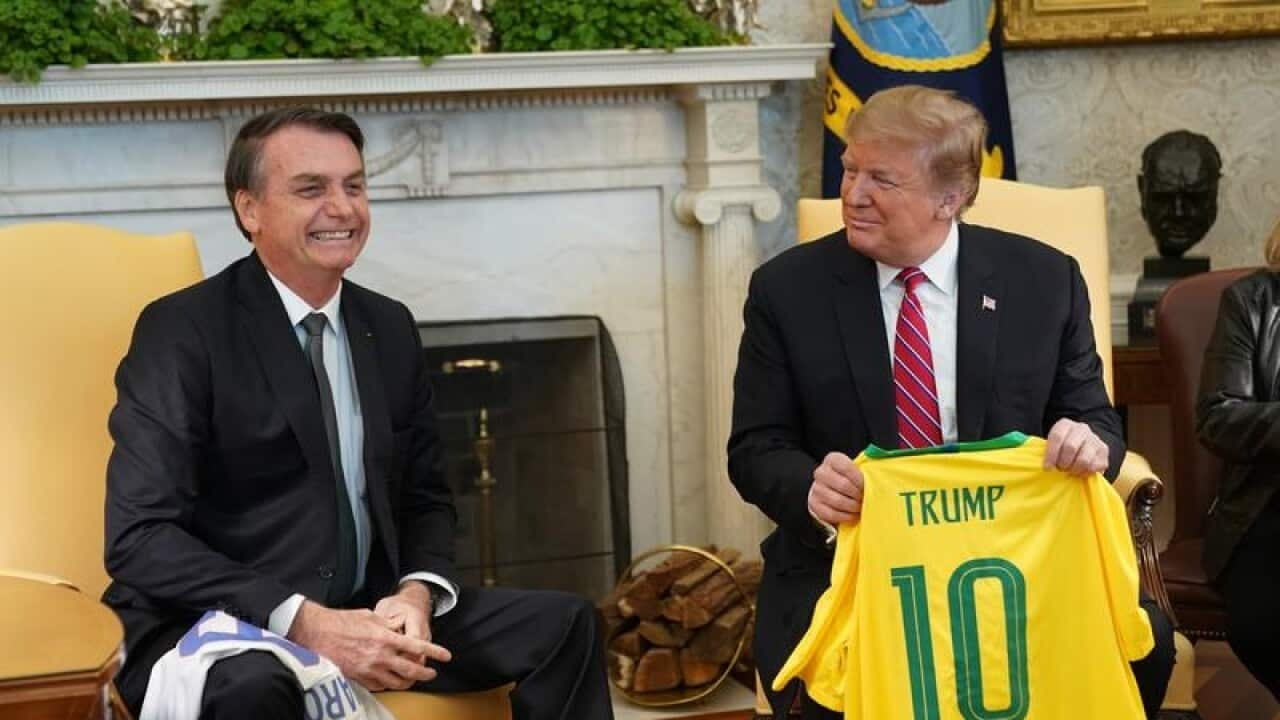Brazilian authorities searching in a remote region of the Amazon for two missing men have come under fire for their handling of the operation.
Supporters have voiced growing concern over the fate of a respected specialist in Indigenous peoples, Bruno Pereira, and British journalist Dom Phillips, a contributor to The Guardian newspaper, who both went missing on 5 June after receiving threats during a research trip in Brazil's Javari Valley.
The area has high activity levels of drug-trafficking, poaching and illegal mining damaging the Amazon rainforest.
Mr Bolsonaro said the pair, who had been working with the Indigenous population to teach them how to use technology to protect ancestral land from environmental criminals, should not have embarked on the "unrecommended adventure".
"Really two people on a boat, in a region like that, completely wild, is an adventure that is not recommended to be done," he said in an interview with SBT News.
"Anything can happen," he added.
Justice Minister Anderson Torres has told reporters he has "300 men in the area, two aircraft and 20 vessels" and "Brazil is tacking action and not fooling about".
Supporters call for more resources
But Indigenous leaders linked to Mr Pereira and Mr Phillips - and the heads of concerned international media outlets including The Washington Post, The Guardian, The New York Times, and Bloomberg News - are criticising the Bolsonaro administration for what they say was a far too slow reaction in its search efforts.
The Guardian and Washington Post wrote a letter on Thursday to Mr Bolsonaro and Brazil’s defence and foreign ministers, pleading for greater resources to be invested into the search. It received more than 20 signatures from the editors of major international and Brazilian media outlets and press freedom organisations.
"We write to express our extreme concern regarding the safety and whereabouts of our colleague and friend Dom Phillips, and Bruno Araújo Pereira, with whom Dom was travelling. Dom is a globally respected journalist with a deep love for and its people," said the letter.

Charred and deforested fields near Porto Velho, Rondonia state, Brazil. Source: AAP / Andre Penner
"As editors and colleagues who have worked with Dom, we are now very concerned by reports from Brazil that search and rescue efforts so far have been minimally resourced, with national authorities slow to offer more than very limited assistance.
"We ask that you urgently step up and fully resource the effort to locate Dom and Bruno, and that you provide all possible support to their families and friends."
Three-time World Cup winner Pelé also added his voice for search efforts to be stepped up.
"The fight for the preservation of the Amazon forest and of the Indigenous groups belongs to all of us," he wrote on Twitter.
Mr Phillips has been a strong critic against the destruction of the Amazon rainforest, singling out what he says has been inadequate government action to prevent it.
Mr Phillips was working on a book about illegal mining in the Amazon which destroyed Indigenous lands and had devastating environmental consequences.
The Guardian reported that both Mr Phillips and Mr Pereira had received threats from miners and loggers who planned on exploiting Indigenous lands just days before their disappearance.
Mr Pereira was a celebrated Indigenous affairs expert and a former government official tasked with protecting uncontacted Brazilian tribes in the Amazon.
"He was like a father to me," a 31-year-old Indigenous leader who led the search for him just hours after his disappearance told The Guardian.
"Now he's gone, I'm not sure what I'll do," he said.
Mr Pereira was sacked from his role at FUNAI (National Indian Foundation) when Mr Bolsonaro took power in 2019. He was removed from his position shortly after he and his team helped make one of the biggest illegal mines in the Amazon region inoperable.
Since Mr Bolsonaro took office in 2019, average annual deforestation in the Brazilian Amazon has risen by 75 percent from the previous decade.
Environmental group Greenpeace said the disappearance of the men is "the tip of the iceberg of the policy of extermination pushed by the current administration".
"The extreme violence and insecurity in the Javari Valley is a reflection of the absence of competent and effective action by the Brazilian government across the Amazon," Greenpeace said in a statement.
Suspect arrested
On Thursday, Brazil's federal police said blood had been found in a boat owned by a suspect in the disappearance of Mr Phillips and Mr Pereira.
Witnesses say they saw the suspect - named as 41-year-old Amarildo da Costa de Oliveira - pursue the two researchers.
Amazonas state security Secretary-General Carlos Alberto Mansur said the suspect was arrested after being found in possession of "a lot of drugs" and a type of unlicensed ammunition that is often used in assault rifles.
Investigators said they uncovered "apparently human organic material" in their search for the possible remains of the missing men.
Emergency official Geonivan Maciel said attention is focused on a site in Cachoeira, near where the men were last seen where members of the search team observed "overturned earth".
Earlier this year, major mining firms operating in Brazil joined together to condemn Mr Bolsonaro's push to legalise mining on Indigenous reservations, including the Amazon rainforest.
The Brazilian Mining Institute (IBRAM), a group representing the largest mining firms operating in the country whose members include Britain's Anglo American, Anglo-Australian firm Rio Tinto and Brazilian mining giant Vale, called Mr Bolsonaro's actions "inappropriate".
"IBRAM condemns all illegal 'garimpo' [artisanal mining] activity on Indigenous lands, in the Amazon or elsewhere, and believes this activity must be fought rigorously and its sponsors brought to justice," the group said in a statement in March.
Additional reporting: AFP











